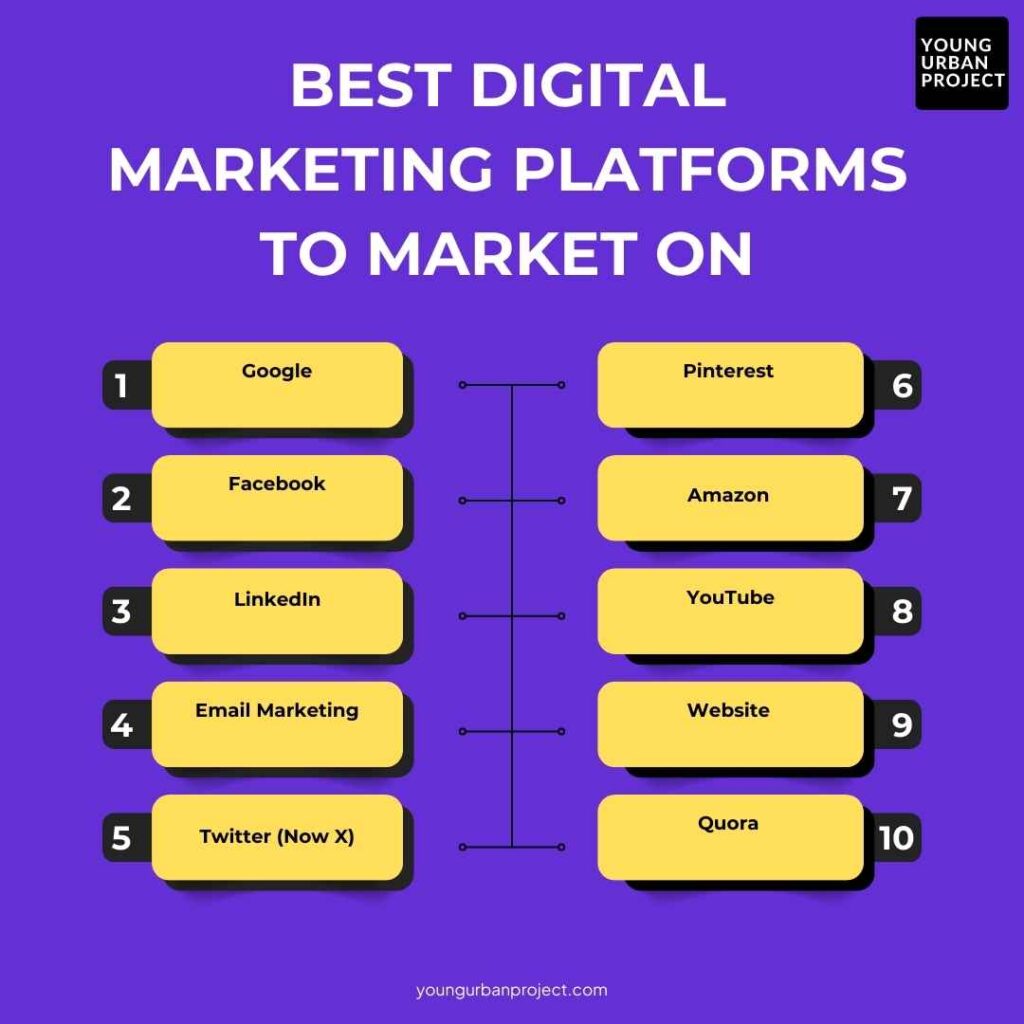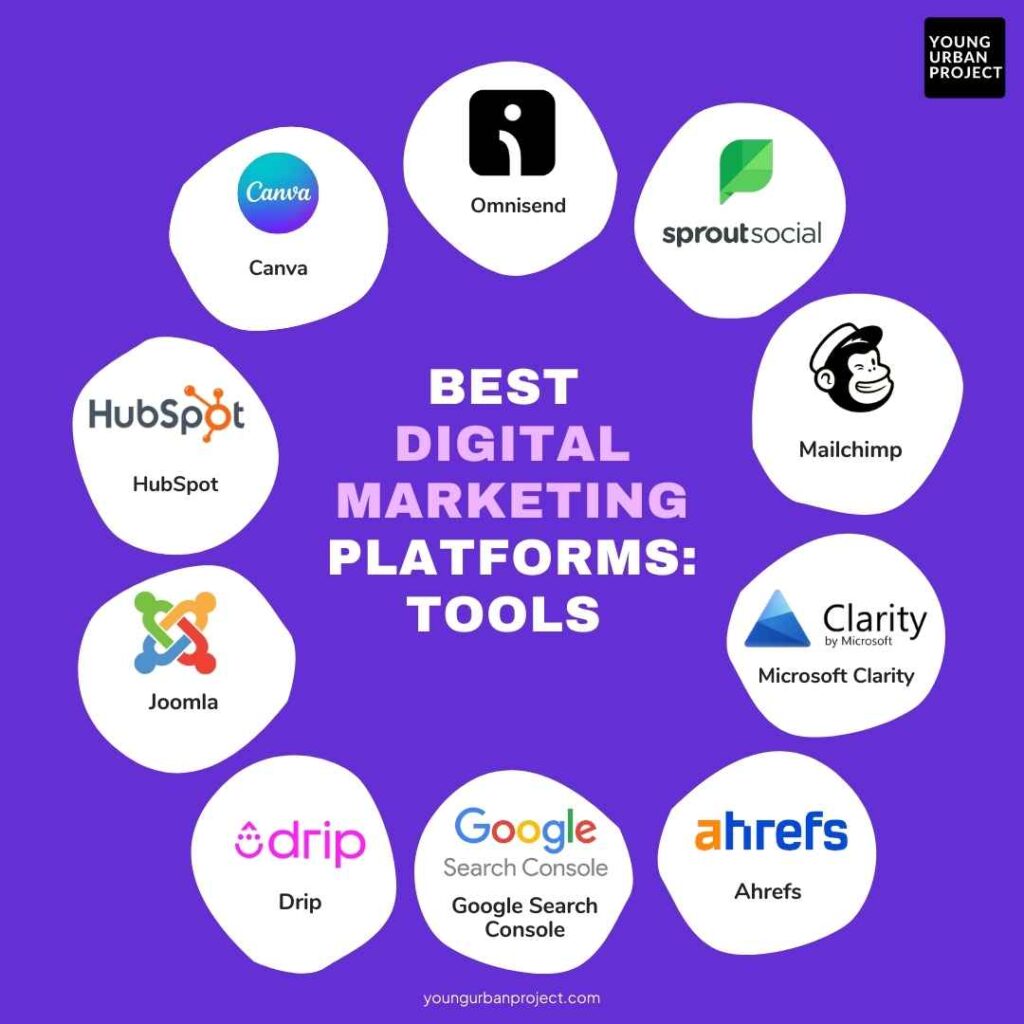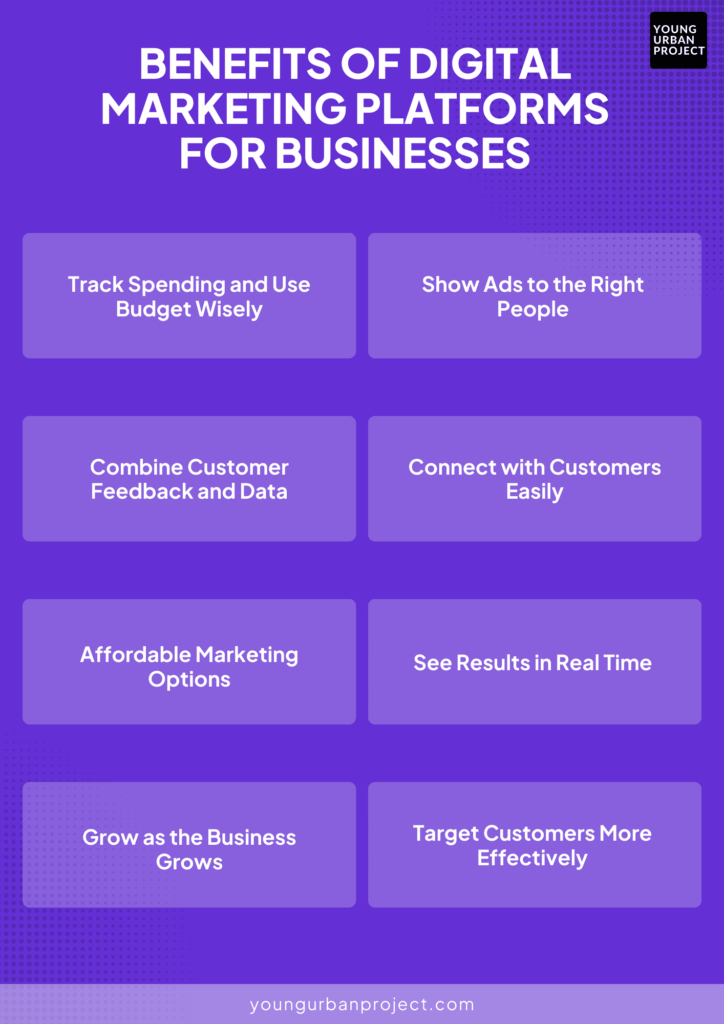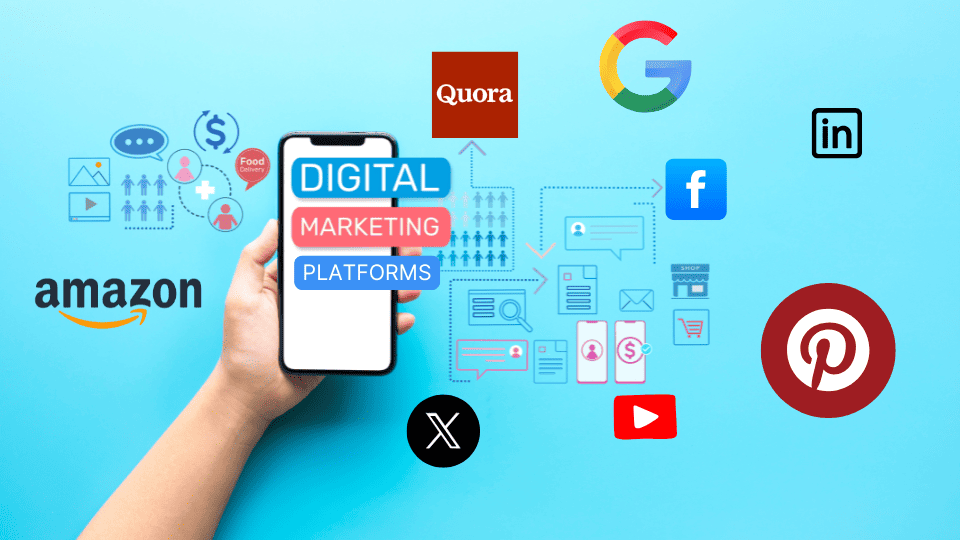Have you ever felt overwhelmed by the number of digital marketing platforms available? With so many options ranging from search engines to social media and email marketing, it can be challenging to decide which platform will deliver the best results for your business. The right choice depends on your goals, target audience, and marketing strategy.
Table of Contents
Some platforms excel in paid advertising, while others are better for organic growth and audience engagement. So, how do you decide which one to choose from a sea of options?
Let us help you! In this blog, we’ll explore the best digital marketing platforms, their key features, and how they can help you achieve your business goals. Whether you’re just starting or looking to refine your strategy, this breakdown will help you make an informed decision.
But First, What is a Digital Marketing Platform?
A digital marketing platform is a tool or channel that helps businesses market and advertise online. It allows them to run ads, track performance, and improve their marketing. These platforms have features like audience targeting, automation, and data tracking.
Each platform has a different purpose. Google Ads helps businesses appear in search results. Facebook and Instagram Ads help show ads to the right people on social media. Email marketing tools like Mailchimp send messages to customers automatically. SEO tools like Ahrefs help websites rank higher on search engines. Some platforms, like HubSpot and Omnisend, offer multiple marketing tools in one place.
The best platform depends on what a business wants to achieve. Some help get more website visitors, while others keep customers engaged. Choosing the right platform helps businesses reach the right people, save time, and improve results. A good digital marketing platform makes online marketing easier and more successful.
Best Digital Marketing Platforms to Market on

Selecting the right digital marketing platform can significantly impact your brand’s visibility, engagement, and revenue. Here’s a breakdown of the top platforms and how they can help you reach your marketing goals.
1. Google

Google is one of the most important parts of digital marketing, offering both organic and paid marketing opportunities:
- Google Ads: Run targeted ads through Search, Display, YouTube, and Shopping campaigns. Ideal for reaching users with high purchase intent.
- SEO (Search Engine Optimization): Optimize your website to rank higher on Google Search organically. This includes keyword optimization, content marketing, and technical SEO improvements.
- Google My Business: Essential for local businesses to improve visibility in search results and Google Maps.
Also Read: How to Become a Google Ads Specialist in 2025?
2. Facebook

Meta’s ecosystem provides both paid and organic marketing opportunities:
- Facebook & Instagram Ads: Powerful targeting options to reach specific demographics, interests, and behaviors. Includes formats like Stories, Reels, and Carousel Ads.
- Organic Social Media: Build brand awareness through engaging posts, videos, and community interaction.
- Threads: A growing platform for text-based engagement, useful for brand conversations.
- WhatsApp Business: Great for direct customer communication, chatbot automation, and promotions.
3. LinkedIn

LinkedIn is the best platform for B2B marketing, professional networking, and lead generation.
LinkedIn Ads:
- Target professionals based on job titles, industries, company size, and skills.
- Use Sponsored Content, InMail ads, and Display ads for brand promotion.
- Best for companies looking to generate high-quality B2B leads.
Organic Marketing on LinkedIn:
- Publish articles, industry insights, and case studies to build thought leadership.
- Engage with professionals in LinkedIn groups and participate in discussions.
- Optimize LinkedIn profiles and company pages to attract organic traffic.
4. Email Marketing

Email remains one of the highest ROI digital marketing channels. It allows businesses to communicate directly with leads and customers.
Email Campaigns & Automation:
- Send promotional emails, newsletters, and personalized offers to segmented audiences.
- Automate email sequences for onboarding, lead nurturing, and re-engagement campaigns.
Best Tools for Email Marketing:
- Mailchimp, Omnisend, Drip, and ActiveCampaign provide automation and analytics.
- Track open rates, click-through rates (CTR), and conversions for campaign optimization.
Lead Nurturing & Customer Retention:
- Convert potential customers into buyers with well-crafted email sequences.
- Re-engage inactive customers with exclusive offers and personalized content.
5. Twitter (Now X)

Twitter is a real-time platform that helps brands engage with their audience through conversations, trending topics, and quick updates.
Twitter Ads:
- Promote tweets, accounts, and hashtags to increase visibility.
- Use Twitter’s interest and keyword targeting for effective ad placements.
Organic Growth Strategies:
- Post timely updates, industry news, and polls to drive engagement.
- Utilize trending hashtags to increase reach and brand exposure.
- Interact with followers, retweet user-generated content, and participate in discussions.
6. Pinterest

Pinterest is a visual discovery platform ideal for businesses in fashion, home décor, food, travel, and DIY industries.
Pinterest Ads:
- Promote pins to reach users searching for inspiration and product ideas.
- Use shopping ads to drive direct purchases from the platform.
Organic Pinterest Marketing:
- Create high-quality, visually appealing pins optimized for search.
- Use keyword-rich descriptions and relevant boards for better discoverability.
- Drive website traffic by linking pins to blog posts, product pages, or landing pages.
7. Amazon

Amazon is essential for e-commerce businesses looking to sell products online.
Amazon Ads:
- Sponsored Product Ads: Appear in search results and product listings.
- Sponsored Brand Ads: Promote a collection of products with a custom headline.
- Display Ads: Appear across Amazon and partner sites.
Amazon SEO (Search Optimization):
- Optimize product listings with relevant keywords, high-quality images, and compelling descriptions.
- Encourage customer reviews to boost rankings and credibility.
Amazon Brand Store & A+ Content:
- Create a dedicated brand store for a better shopping experience.
- Use enhanced product descriptions and visuals to improve conversions.
8. YouTube

YouTube is the second-largest search engine and the best platform for video marketing.
YouTube Ads:
- Run skippable and non-skippable video ads to reach targeted audiences.
- Use overlay ads, display ads, and bumper ads for brand awareness.
Organic YouTube Growth:
- Optimize video titles, descriptions, and tags for SEO.
- Create engaging content such as tutorials, product demos, and vlogs.
- Encourage subscriptions and engagement with calls-to-action (CTAs).
9. Website (Your Digital Headquarters)

Your website is your most valuable online asset for branding, lead generation, and conversions.
Content Marketing & SEO:
- Publish blog posts, case studies, and landing pages to attract organic traffic.
- Optimize website speed, structure, and content for search engines.
Lead Generation & Conversion Optimization:
- Use forms, pop-ups, and CTAs to capture leads.
- Implement A/B testing to improve conversion rates.
User Experience (UX) & Analytics:
- Ensure mobile responsiveness and fast loading times.
- Use tools like Google Analytics to track visitor behavior and optimize performance.
10. Quora

Quora is a question-and-answer platform that helps brands establish authority in their industry.
Quora Ads:
- Promote content to users actively searching for solutions in your niche.
- Target specific questions, topics, and audiences for higher engagement.
Organic Quora Marketing:
- Answer industry-related questions with in-depth responses.
- Include links to relevant blog posts or resources to drive website traffic.
- Build credibility and thought leadership by consistently providing valuable insights.
Best Digital Marketing Platforms: Tools For Marketing Efficiently

1. Omnisend

Best for: E-commerce email marketing and automation
Omnisend is a powerful all-in-one marketing platform designed specifically for e-commerce businesses. It combines email marketing, SMS, and push notifications to help you engage customers at every stage of their journey.
Features:
- Drag-and-drop email builder
- Pre-designed templates for campaigns
- Advanced segmentation and personalization
- SMS and push notifications
- Automation workflows for abandoned carts and post-purchase follow-ups
Pros:
- User-friendly interface
- Multi-channel marketing (email, SMS, push)
- Excellent automation features for e-commerce
- Affordable pricing for small businesses
Cons:
- Limited integrations compared to competitors
- SMS pricing can add up quickly
Pricing:
- Free plan available (up to 250 contacts)
- Paid plans start at $16/month
2. Sprout Social

Best for: Social media management and analytics
Sprout Social is a robust social media management tool that helps businesses schedule posts, analyze performance, and engage with their audience across multiple platforms.
Features:
- Social media scheduling and publishing
- In-depth analytics and reporting
- Social listening and monitoring
- CRM tools for managing customer interactions
- Collaboration tools for teams
Pros:
- Comprehensive social media management
- Excellent customer support
- Intuitive interface
- Robust analytics for tracking performance
Cons:
- Expensive for small businesses
- Limited features on the entry-level plan
Pricing:
- Starts at $199/month (billed annually)
3. Mailchimp

Best for: Email marketing and small business campaigns
Mailchimp is one of the most popular email marketing platforms, known for its ease of use and versatile features. It’s perfect for small businesses looking to build and nurture their email lists.
Features:
- Email campaign builder with templates
- Audience segmentation and personalization
- Marketing automation
- Basic CRM tools
- Analytics and Reporting
Pros:
- Free plan for up to 500 contacts
- Easy to use for beginners
- Wide range of integrations
Cons:
- Pricing can escalate quickly as your list grows
- Limited automation features compared to competitors
Pricing:
- Free plan available
- Paid plans start at ₹575/month
4. Microsoft Clarity

Best for: Website analytics and user behavior tracking
Microsoft Clarity is a free analytics tool that helps you understand how users interact with your website through heatmaps, session recordings, and more.
Features:
- Heatmaps to visualize user interactions
- Session recordings to track user journeys
- Click and scroll tracking
- Free and easy to set up
Pros:
- Completely free to use
- Easy integration with websites
- Provides actionable insights for improving UX
Cons:
- Limited advanced analytics compared to premium tools
- No real-time data
Pricing:
- Free
5. Ahrefs

Best for: SEO and keyword research
Ahrefs is a comprehensive SEO toolset that helps businesses improve their search engine rankings through keyword research, backlink analysis, and competitor insights.
Features:
- Keyword research and tracking
- Backlink analysis and monitoring
- Site audit tools
- Competitor analysis
- Content explorer for topic ideas
Pros:
- Comprehensive SEO toolkit
- Accurate and up-to-date data
- Great for competitor research
Cons:
- Expensive for small businesses
- Steep learning curve for beginners
Pricing:
- Starts at $129/month.
6. Google Search Console

Best for: Website performance and SEO monitoring
Google Search Console is a free tool that helps you monitor and optimize your website’s presence in Google search results.
Features:
- Track website rankings and performance
- Identify and fix indexing issues
- Monitor backlinks
- Mobile usability reports
Pros:
- Completely free
- Essential for SEO and website health
- Direct integration with Google Analytics
Cons:
- Limited advanced features
- Data can sometimes be delayed
Pricing:
- Free
7. Drip

Best for: E-commerce marketing automation
Drip is a marketing automation platform tailored for e-commerce businesses, offering advanced email marketing, CRM, and segmentation tools.
Features:
- Email marketing and automation
- CRM tools for managing leads
- Advanced segmentation and personalization
- Integrations with e-commerce platforms
Pros:
- Powerful automation features
- Great for e-commerce businesses
- Excellent customer support
Cons:
- Pricing can be high for small businesses
- Limited design flexibility for emails
Pricing:
- Starts at $39/month
8. Joomla

Best for: Content management and website building
Joomla is an open-source content management system (CMS) that allows you to build and manage websites with ease. It’s highly customizable and ideal for developers.
Features:
- Open-source CMS for building websites
- Thousands of extensions and templates
- SEO-friendly structure
- Multi-language support
Pros:
- Free and open-source
- Highly customizable
- Great for developers
Cons:
- Requires technical knowledge to set up
- Limited support compared to hosted platforms
Pricing:
- Free (hosting and additional extensions may cost extra)
9. HubSpot

Best for: All-in-one inbound marketing
HubSpot is a comprehensive marketing platform that combines CRM, email marketing, automation, and analytics to help businesses grow.
Features:
- CRM, email marketing, and automation
- Social media management
- SEO and content marketing tools
- Analytics and reporting
Pros:
- Comprehensive marketing suite
- Free CRM available
- Excellent for lead nurturing
Cons:
- Expensive as you scale
- Can be overwhelming for beginners
Pricing:
- Free plan available
- Paid plans start at $15/month
10. Canva

Best for: Graphic design and visual content creation
Canva is a user-friendly design tool that allows businesses to create stunning visuals for social media, ads, and more, even without design experience.
Features:
- Drag-and-drop design tool
- Thousands of templates for social media, ads, and more
- Stock photos, icons, and fonts
- Collaboration tools for teams
Pros:
- Easy to use, even for non-designers
- Free plan available
- Affordable premium features
Cons:
- Limited advanced design capabilities
- Some templates are overused
Pricing:
- Free plan available
- Pro plan starts at ₹500 /month.
Benefits of Digital Marketing Platforms for Businesses

1. Track Spending and Use Budget Wisely
Digital marketing platforms help businesses see where their money is going. They provide real-time data on ad costs, clicks, and sales. Businesses can track important numbers like cost-per-click (CPC) and return on ad spend (ROAS). This helps them spend money on ads that work and stop wasting money on ones that don’t.
2. Show Ads to the Right People
These platforms help businesses target the right audience. They can choose who sees their ads based on age, interests, and online behavior. This makes it more likely that people will click and buy. Businesses can also test different ads to see which one performs better, helping them improve results over time.
3. Combine Customer Feedback and Data
Businesses can collect both numbers (like website visitors and sales) and opinions (like customer reviews and feedback). This helps them understand what customers want. By using this data, businesses can create better ads, improve their products, and grow faster.
4. Connect with Customers Easily
These platforms help businesses stay in touch with customers through social media, emails, and search ads. Automated emails, chatbots, and social media posts keep customers engaged. This builds trust and encourages repeat purchases, helping businesses grow over time.
5. Affordable Marketing Options
Digital marketing is much cheaper than TV, radio, or newspaper ads. Businesses can start with a small budget and still reach a large audience. Options like pay-per-click (PPC) ads, SEO, and social media marketing allow businesses to promote their products without spending too much money.
6. See Results in Real Time
Businesses don’t have to wait weeks to know if their ads are working. Digital platforms provide live reports with key data like website traffic, conversions, and bounce rates. This allows businesses to make quick changes if something isn’t working, improving their results immediately.
7. Grow as the Business Grows
Digital marketing platforms work for all business sizes. Startups can begin with small campaigns, while big companies can run large-scale ads. As businesses grow, they can increase budgets, enter new markets, and use automation to manage more customers without extra effort.
8. Target Customers More Effectively
Businesses can personalize ads to match customer interests. Platforms like Google and Facebook allow detailed targeting based on past behavior, location, and interests. Personalized ads make customers feel more connected to a brand, leading to better engagement and more sales.
Conclusion
Digital marketing platforms have completely changed the way businesses connect with customers. Whether you want to run ads, grow your brand on social media, or improve your website’s search ranking, there’s a platform that fits your needs. The best part? You don’t need a massive budget to get started. Many tools offer free or affordable plans, making digital marketing accessible to businesses of all sizes.
The biggest advantage of these platforms is data. Unlike traditional marketing, where results are harder to track, digital platforms give you real-time insights. You can see what’s working, tweak your strategy, and get better results without wasting money.
The key to success is choosing the right platform based on your goals. Want to drive website traffic? Focus on SEO and Google Ads. Looking to engage your audience? Social media and email marketing are great options. With the right approach, digital marketing can help businesses grow and stay ahead of the competition.
FAQs Related to Digital Marketing Platforms
What is the purpose of a digital marketing platform?
A digital marketing platform is a tool or software that helps businesses run, manage, and track their online marketing campaigns. It makes it easier to target the right audience, manage ads, improve SEO (search engine optimization), create content, and measure results. This helps businesses save time and see what’s working.
Which digital marketing platforms are the best for businesses?
The best platform depends on your business goals and who you want to reach. For example:
1. Use Google Ads and SEO tools to get noticed on search engines.
2. Use Facebook and Instagram for social media marketing.
3. Use LinkedIn for B2B (business-to-business) marketing.
4. Tools like Mailchimp (for emails) and HubSpot (for automation) can also make your marketing smoother.
What are some budget-friendly digital marketing platforms?
Yes! Some affordable or free options include:
1. Google Search Console: Free tool to track SEO performance.
2. Mailchimp: Free for small email lists.
3. Canva: Free tool to create designs.
4. Buffer: Free plan for scheduling social media posts.
Many platforms also offer free trials or low-cost plans for small businesses.
How can I select the best digital marketing platform for my business?
Choosing the right platform starts with understanding your goals, target audience, and budget. If your main goal is to generate leads, platforms like Google Ads or LinkedIn are good options. If you want to focus on engagement, social media platforms like Facebook or Instagram are ideal. Once you know your needs, compare different platforms based on their features, pricing, and how well they integrate with your existing tools. This will help you find the platform that best fits your business and helps you achieve your marketing goals.

